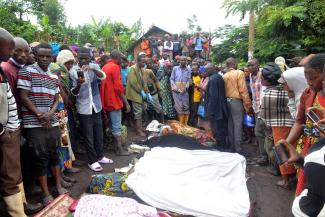Climate crisis
International media have largely neglected Uganda’s flooding

This year, the long-awaited rain-season resulted in flooding in many parts of the country. The impacts were worst in areas with fragile ecosystems, such as hilly and mountainous areas, forests, riverbanks, lakeshores and rangelands. Compounding the problems, these areas have been exposed to encroachments and degradation in recent years. It matters that the population has almost doubled from 23 million to 44 million since the turn of the millennium. In the course of industrialisation, pollution levels are increasing. The country is thus facing multiple environmental challenges.
The impacts of global heating are proving particularly disruptive. Droughts, floods, storms, heat waves and landslides are rampant, denting agricultural production and reducing food security. Moreover, hygiene conditions have deteriorated in areas that faced prolonged rains. The cholera risk has grown accordingly.
Communities have suffered immensely. In August and September, floods claimed more than 60 lives, according to reports. Many people have lost their homes. A humanitarian crisis is brewing. Relief agencies had to step in. The worst affected areas are in the Elgon, Southwestern, Lango and West Nile subregions.
Uganda’s current problems are not getting much international attention. The floods that submerged about one third of Pakistan made headlines around the world (see Imran Mukhtar on www.dandc.eu).
Compared with Pakistan’s flood disaster, the Ugandan numbers are small. About 90,000 persons are directly affected. Their suffering is real, of course. The full truth is that the climate crisis is hurting far more people around the world than the media’s focus on only the worst cases would have you believe.
Uganda’s economy largely depends on farmers. Most of them rely on rainfed agriculture. Many of them worry about the harvest. “The rains are good for us,” said Kasasa Emmanuel, a farmer from Wakiso district, in the summer, “but if they continue falling as heavily, our crops maybe destroyed.” However, experts still expect the harvest to be good, especially in areas that did not see excessive rainfall.
The urgent need to adapt
What is critical at this point, according to Alex Businge of the consultancy Harvest Agriculture Solutions, “is to strengthen earlywarning systems.” Alerting people, after all, helps to reduce the damage extreme weather can do.
Early-warning systems, however, are only one component of adapting to global heating. Weather patterns are changing, and that affects multiple sectors apart from farming. There are repercussions for water supply, human health and settlements and infrastructure in general, for example.
Julius Mucunguzi, a government official, says: “The long-term solution is to protect the environment, stay clear of wetlands, riverbanks and avoid destroying river pathways.” In his eyes, climate change is undeniable. “You can no longer predict when the rains will come and how intense they will be,” he adds.
In Uganda and many other developing countries, national governments tend to be overwhelmed. Inflation, which arose from impacts of prolonged Covid-19 lockdowns and has been exacerbated by commodities becoming more scared due to Russia’s invasion of Ukraine, is causing hardship (see my contribution on www.dandc.eu).
Least-deve loped countries deserve compensations for damages they did little to cause, so major polluters must be held accountable. We need an international agreement on “loss and damage” (see Saleemul Huq on www.dandc.eu).
Our governments must find and implement local solutions moreover. Nature-based options make sense. They are comparatively cheap and highly effective, serving both adaptation and mitigation (see David Mfitumukiza on www.dandc.eu).
Short-term needs tend to divert attention from long-term needs. The international community, however, cannot afford to neglect the climate crisis. We must not allow problems to spin out of control.
Ronald Ssegujja Ssekandi is a Ugandan author and edits D+C/E+Z’s Nowadays column.
sekandiron@gmail.com



